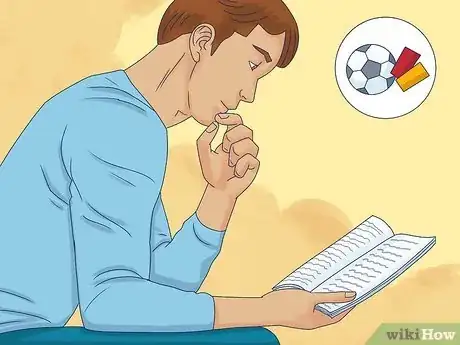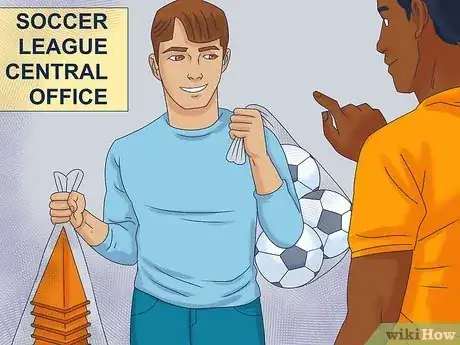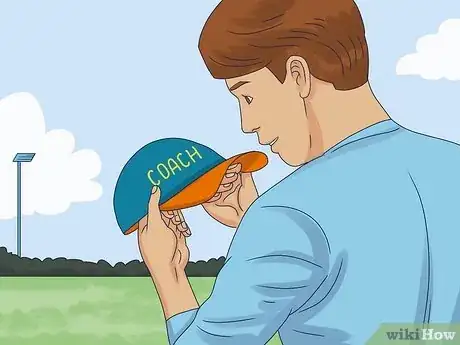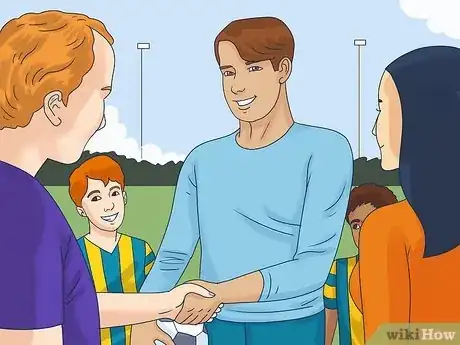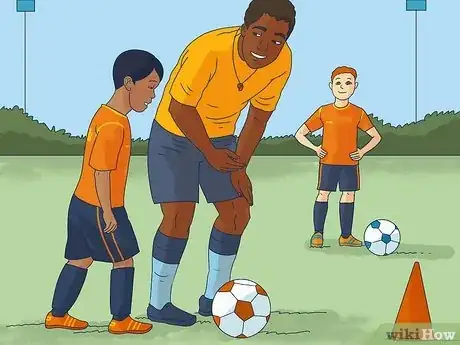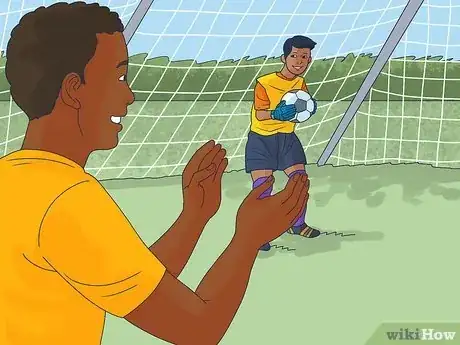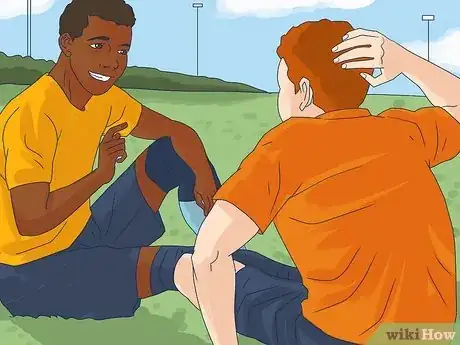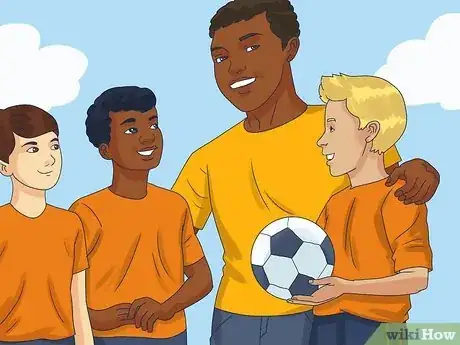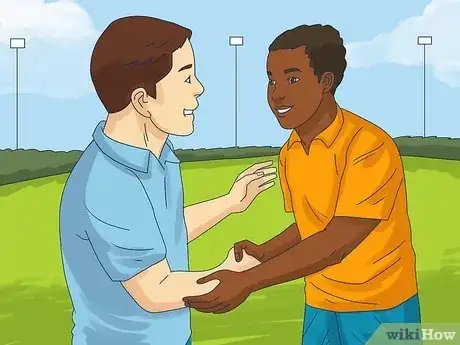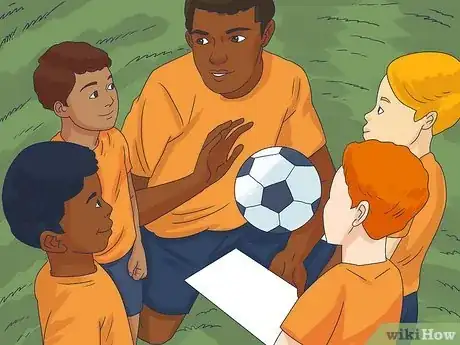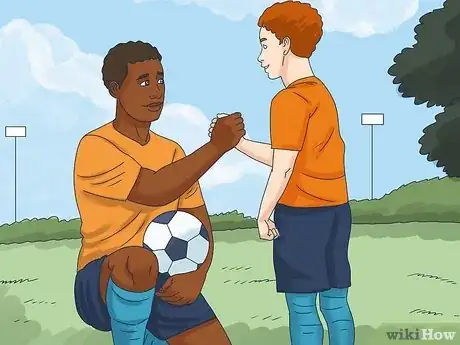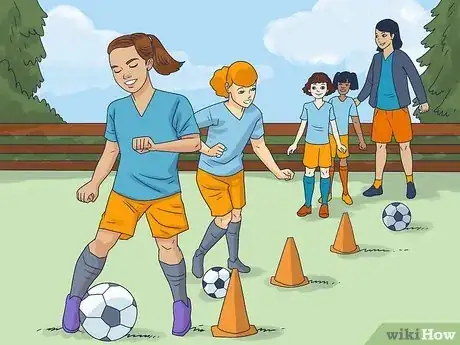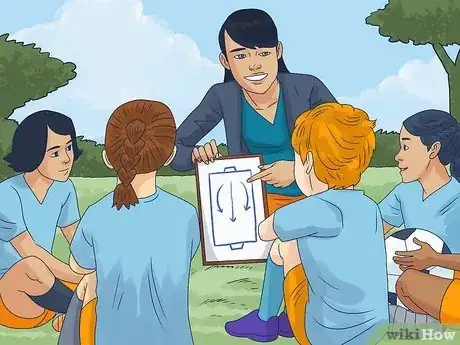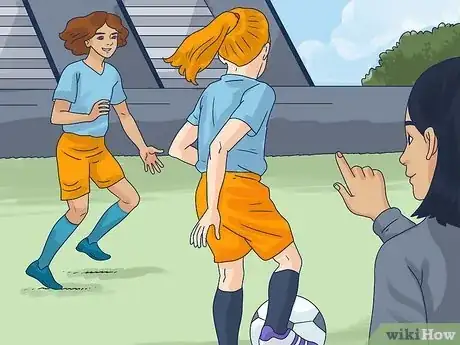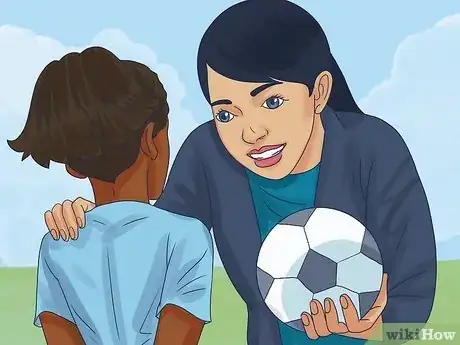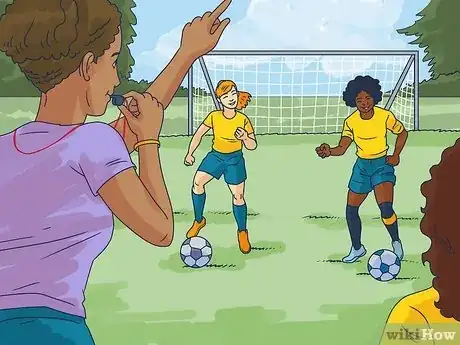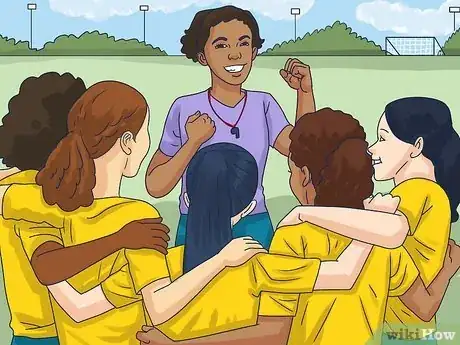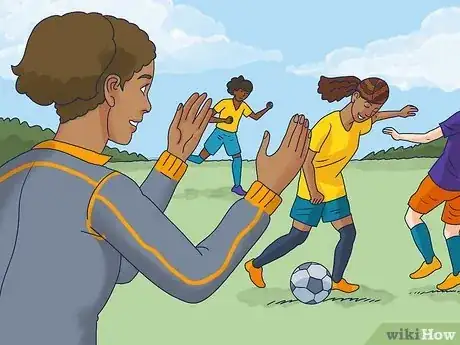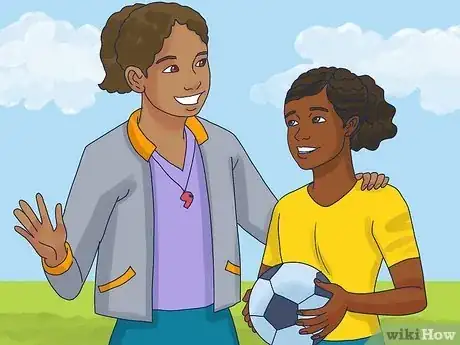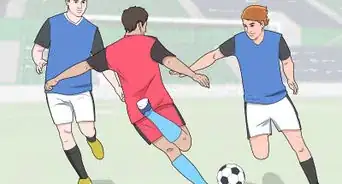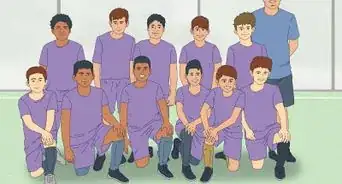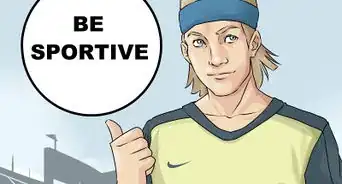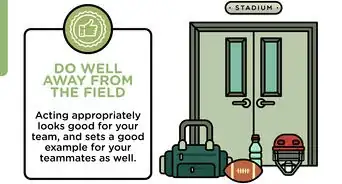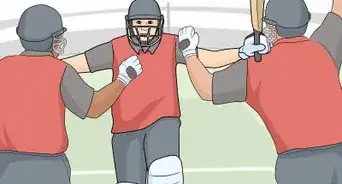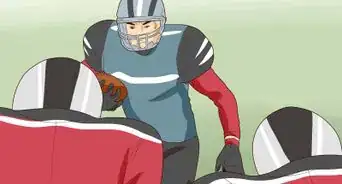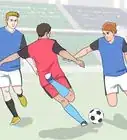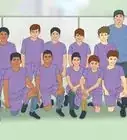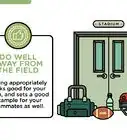This article was co-authored by Bernat Franquesa. Bernat Franquesa is the Co-Founder and Head of Methodology at APFC (Albert Puig Football Concepts), a youth development program for players and coaches with headquarters in San Diego, California. APFC provides soccer training for youth and educational content and consulting services for coaches, academies, and clubs. At APFC, Bernat is responsible for co-developing and applying technical guidelines for player development programs. He has been coaching soccer in Catalunya and the US since he was 15 years old.
There are 11 references cited in this article, which can be found at the bottom of the page.
This article has been viewed 97,085 times.
Coaching a soccer team is an extremely rewarding and fun experience. Coaching a soccer team means running drills and organizing scrimmages, but it also means setting a positive tone for the team and modeling good sportsmanship, responsibility, respect, and the other values you want your players to demonstrate.[1] Help your team grow by encouraging them to both have fun and give the game their all.
Steps
Preparing for the Season
-
1Learn the basic rules of the game by reading your league rule book. If you are preparing to coach a youth soccer team, you might have only a vague understanding of the rules of the game. That’s okay! It’s easy to learn the basics, and your league officer probably provided you with a rule book when you signed on as a coach.[2] Read this rule book carefully to get a better grasp on soccer’s many rules.[3]
- If your league office didn’t provide you with a rule book, contact them and ask for a crash course on soccer rules. You can also rely on your assistant coaches to help you understand the finer points of the game.
- In most leagues, each team can have up to 11 players on the field at any time, but cannot have fewer than 7 players on the field at any time.
- Except for the two goalies (one per team), players cannot use the their hands to move the ball.
- The team that scores the most goals by the end of the two 40-minute halves of the game wins.
- Don’t be afraid to ask questions about the rules if you are confused.
-
2Learn how your league operates by looking over your league guidebook. In addition to the league rules, your league’s central office should provide a guidebook with instructions about game schedules and requirements for practice. Ask the league office what materials they provide, if any.[4]
- Most leagues provide soccer balls, uniforms, and some additional equipment like orange cones for drills.
Advertisement -
3Determine your coaching philosophy. Your coaching philosophy is determined by the values and purpose you bring to the coaching process, as well as your leadership style. Spend some time thinking about why you want to coach a soccer team and how you can best share the values that you believe are important for your team to practice.[5]
- By actively determining your coaching philosophy, you’ll be better able to teach and demonstrate the values that are important to you, including team unity, self-confidence, good sportsmanship, responsibility, and respect.
-
4Let parents know what you expect of them and their children if you’re coaching a youth league. Either before the season begins or at the first practice of the season, talk to all the parents and answer any questions they might have. Inform them of the basic schedule for games and practices, and share your vision for the team with them. This will help set a positive tone for the season.[6]
- Additionally, let the parents know that you expect them to promote good sportsmanship and help them get their child to practice and games on time.
- You might want to establish a snack schedule at the outset of the season, too. Create a sign-up sheet with different dates for parents to bring snacks on.
Developing Your Team
-
1Offer constructive criticism. Instead of just offering negative criticism, offer specific suggestions and recognize your players’ effort. For instance, instead of saying, “You didn’t kick the ball properly,” say “That was a great attempt, but next time, try kicking like this,” then show the player the proper technique.
- Use compassionate language when criticizing a player and put yourself in their shoes.
- Keep criticism brief and to the point. Don’t hammer away at a player about a mistake they made. Instead, point out their error, offer a correction, then move on.
- Acknowledge your team’s effort when they meet goals and milestones. For instance, if your team wins a game, tell them how proud you are.[7]
-
2Praise good performance as often as possible. In addition to pointing out occasions where players could do something better, draw attention to the things your players do well. For instance, if your goalie makes a great save, praise them by saying, “Wow, great save!” or “Nice work!”[8]
-
3Help underperforming players improve. Don’t sideline your players who are not performing as well as the rest of their team. The specific action you take to help a player improve depends on what their issue is.[9]
- For instance, sometimes players just need to hear a technique or strategy explained in a different way.
- If a player is having a hard time with a certain movement, you could get your assistant coach to work with them in a special session.
-
4Have reasonable expectations about what your players can do. Soccer teams vary widely in their experience levels and abilities. Identifying what your players are (and should be) capable of will enable you to tailor your coaching style to your players’ needs.
- Teens and adults are more capable of learning new techniques and modifying their behavior than kids.
- Children of different age groups will have different levels of understanding. Even within a given age group, individuals have different strengths and weaknesses, so set your expectations accordingly.
- Kids under 6, for instance, should be oriented toward having fun and building positive social interactions with you and their teammates. Your main goal with kids of this age is to get them to kick the ball in the right direction.
- Help kids who are 7 to 10 years old develop a stronger sense of team play by encouraging passing and back-and-forth drills with the soccer ball. Emphasize the importance of team victory over individual achievement.
- Players who are 11 years old or older should be able to learn more complex tactics and plays. They can also more easily accept feedback and correct their technique. Drills, feedback, and instructions for older players can be more complex than those for younger players.
-
5Encourage good sportsmanship by setting a positive example. Do not use foul language during games or practice, and don’t second-guess the referees. After the game, shake hands with the coach of the opposing team, no matter the outcome. Insist on all your players shaking hands with the opposing team.
-
6Improve your team by setting small goals and meeting them. Setting and achieving a series of small goals can improve your team’s confidence and, hopefully, help them win more frequently. You could set goals within either a practice session or a game.[10]
- For instance, if you’re coaching a group of teens, you might ask every player to score a goal from the penalty spot during practice.
- You could also set a goal for your team to score at least one goal during each game, even if your team doesn’t win.
-
7Adapt your coaching style to individual players. For instance, if you have a player who gets easily discouraged, they might require a lot of encouragement and verbal praise before they can develop and find their role on the team. Other players might overconfident and require more criticism than their teammates.[11]
- An undisciplined player might respond best to increased pressure and challenges. For instance, if you have a player who tends to not give the game their best shot, you might tell them “Pick it up! Move faster!”
- Some players might have physical challenges that you need to adapt to. In such a case, focus on what the player can do, rather than what they cannot. For instance, if a player gets tired easily, put them in a goalie position where they will not have to run great distances.
- Observe your players carefully to determine how you can best help them flourish.
Running a Practice Session
-
1Incorporate a wide variety of movements during practice sessions. During practice, select drills that enable players to run, skip, hop, and jump. Other drills should encourage bending, twisting, pulling, and pushing. This will give your players the opportunity to refine their sense of balance and improve overall fitness.[12]
- For instance, you could have your players do 30 pushups, then skip around the field one time, then do crab walks from one end of the field to the other.
- This is especially important for youth leagues, since kids need to constantly adjust to a new center of balance as they grow.
-
2Be clear and concise when offering direction. Use language that your players will understand. If your players are 10 years old, the language you’ll need to use will need to be considerably simpler than language you can use with a teen or adult. Communicating clearly will facilitate positive changes in your players’ performance.
- For instance, if you’re talking to young children, you might say, “Let’s keep the ball away from the other team.”
- With teens or adults, you might use more complex terminology that refers to particular positions (defense, offense) and areas of the field (midfield, penalty box, and so on). Your directions can also be more complex. For instance, you could say, “We should trap the goalie using a triangle play to keep them off-balance.”
-
3Add complexity to drills over time. Early in the season, introduce your players to simple drills like passing from one player to another. Over time, make your drills more complex by, for instance, having your players pass the ball back and forth to each other while running downfield.
- You’ll know you’ve spent enough time on a given drill if most of your players can execute it without difficulty. At this point, you can move on to drills of greater difficulty.
- Make sure your drills follow the rules of the game. This will help your players understand and follow the rules as a habit.[13]
-
4Do not punish your players. The primary focus of any sport should always be on ensuring your players have fun, so don’t be overly strict with them. Do not, for instance, withhold water if they don’t perform well during a drill. Similarly, don’t make them run sprints or laps as punishment.
Coaching on Game Day
-
1Have your team warm up. Since soccer involves a lot of running, its particularly important to help your players exercise their legs. Have your team run around the perimeter of the field two or three times. Some simple passing drills will also help your team prepare for the game.[14]
- For instance, have your players divide into 2 rows about 10 metres (33 ft) apart. Players in each row should be about 3 metres (9.8 ft) apart. Instruct them to pass a ball back and forth to their partner in the opposite row.
-
2Pump your players up with a pregame talk. Just before the game begins, huddle with all your players and offer a brief pep talk to boost their morale. In a calm and relaxed tone, encourage your players to both have fun and give it their all.[15]
- For instance, you might say, “Alright team-you’ve practiced long and hard, now it’s time for all that practice to pay off. We’re going to have fun, we’re going to practice good sportsmanship, but we’re also going to play hard. Now let’s go out there and win this thing!”
-
3Keep your coaching to a minimum during the game. During the game, you should mostly be focused on offering vocal encouragement and on switching players in and out rather than offering advice. Swap players out every 10 minutes or so, and keep team morale high by pushing them to give the game their all.
- It’s okay to offer some advice and subtle reminders when you put new players in. For instance, you might gently remind a player headed onto the field, “Just like we practiced, stay near the goalie, okay?”
-
4Offer pointers right after the game if a player fails to meet expectations. Don’t wait until the next practice or the next game before offering feedback if a player made a mistake or did something wrong. Pull them aside after the game and privately explain what happened and what you want them to learn.[16]
- As with any other occasion when you offer criticism, keep it brief and to the point, and offer positive feedback at the same time.
Expert Q&A
Did you know you can get expert answers for this article?
Unlock expert answers by supporting wikiHow
-
QuestionWhat kind of drills will help my players improve?
 Bernat FranquesaBernat Franquesa is the Co-Founder and Head of Methodology at APFC (Albert Puig Football Concepts), a youth development program for players and coaches with headquarters in San Diego, California. APFC provides soccer training for youth and educational content and consulting services for coaches, academies, and clubs. At APFC, Bernat is responsible for co-developing and applying technical guidelines for player development programs. He has been coaching soccer in Catalunya and the US since he was 15 years old.
Bernat FranquesaBernat Franquesa is the Co-Founder and Head of Methodology at APFC (Albert Puig Football Concepts), a youth development program for players and coaches with headquarters in San Diego, California. APFC provides soccer training for youth and educational content and consulting services for coaches, academies, and clubs. At APFC, Bernat is responsible for co-developing and applying technical guidelines for player development programs. He has been coaching soccer in Catalunya and the US since he was 15 years old.
Licensed Soccer Coach & Head of Methodology at APFC First of all, all the drills that you use in your soccer practices should follow the rules of the game. I've seen many coaches use drills that don't follow the rules of the game, and it's not realistic for the players. Following the rules of the game in your drills will help your team really understand the rules and know them as a habit.
First of all, all the drills that you use in your soccer practices should follow the rules of the game. I've seen many coaches use drills that don't follow the rules of the game, and it's not realistic for the players. Following the rules of the game in your drills will help your team really understand the rules and know them as a habit. -
QuestionI am still in high school. Is it possible for me to become a coach?
 Community AnswerYes. You can coach younger kids, like elementary age, and show them the basics.
Community AnswerYes. You can coach younger kids, like elementary age, and show them the basics. -
QuestionHow can I be the best coach?
 Community AnswerThere is no such thing as being the best coach, but there is being an unforgettable coach, who leaves a fingerprint in the hearts of his players. This is achieved by dedication, determination and discipline. A coach who can offer these three characteristics to his team is one that will never be forgotten.
Community AnswerThere is no such thing as being the best coach, but there is being an unforgettable coach, who leaves a fingerprint in the hearts of his players. This is achieved by dedication, determination and discipline. A coach who can offer these three characteristics to his team is one that will never be forgotten.
References
- ↑ Bernat Franquesa. Licensed Soccer Coach & Head of Methodology at APFC. Expert Interview. 3 March 2020.
- ↑ Bernat Franquesa. Licensed Soccer Coach & Head of Methodology at APFC. Expert Interview. 3 March 2020.
- ↑ https://books.google.com/books?id=zBMGm3dNPz0C&lpg=PP1&pg=PT27#v=onepage&q&f=false
- ↑ https://books.google.com/books?id=zBMGm3dNPz0C&lpg=PP1&pg=PT27#v=onepage&q&f=false
- ↑ http://www.coach.ca/develop-a-coaching-philosophy-in-3-easy-steps-p159158
- ↑ https://books.google.com/books?id=zBMGm3dNPz0C&lpg=PP1&pg=PT92#v=onepage&q&f=false
- ↑ https://hbr.org/2015/02/how-to-coach-according-to-5-great-sports-coaches
- ↑ http://www.dummies.com/sports/soccer/coaching-soccer-for-dummies-cheat-sheet/
- ↑ https://hbr.org/2015/02/how-to-coach-according-to-5-great-sports-coaches
- ↑ https://hbr.org/2015/02/how-to-coach-according-to-5-great-sports-coaches
- ↑ https://hbr.org/2015/02/how-to-coach-according-to-5-great-sports-coaches
- ↑ Bernat Franquesa. Licensed Soccer Coach & Head of Methodology at APFC. Expert Interview. 3 March 2020.
- ↑ Bernat Franquesa. Licensed Soccer Coach & Head of Methodology at APFC. Expert Interview. 3 March 2020.
- ↑ http://www.dummies.com/sports/soccer/coaching-soccer-for-dummies-cheat-sheet/
- ↑ http://www.dummies.com/sports/soccer/coaching-soccer-for-dummies-cheat-sheet/
- ↑ https://hbr.org/2015/02/how-to-coach-according-to-5-great-sports-coaches
About This Article
To coach a soccer team, start by running practice sessions that include a variety of skills, like dribbling, passing, and shooting. Then, give directions using clear and concise language that’s age-appropriate for your team. Additionally, praise good performance to encourage your players, and use constructive criticism to correct mistakes, rather than yelling at players or putting them down. You should also set small, achievable goals to build confidence, making sure to work with underperforming players to help them improve. For tips on how to adapt your coaching style to individual players on your team, read on!

